Atlanta, GA Pollen and Allergy Report for Summer 2023
Pollen Allergy Trends in Atlanta, GA
When is pollen lowest in Atlanta, GA?

February
Lowest month total PPM
Avg. PPM
When is pollen highest in Atlanta, GA?

April
Highest month total PPM
Avg. PPM
How does pollen in Atlanta, GA compare to Georgia?
Atlanta has a higher average PPM than the state of Georgia.
Atlanta yearly avg PPM:
Georgia yearly avg PPM:
How does pollen in Atlanta, GA compare to the USA?
Atlanta has a higher average PPM than the USA.
Atlanta yearly avg PPM:
USA yearly avg PPM:
Is pollen worse this year in Atlanta, GA?
Spring 2023 was better than spring 2022.
Spring 2023 PPM:
Spring 2022 PPM:
Average PPM in Atlanta, GA
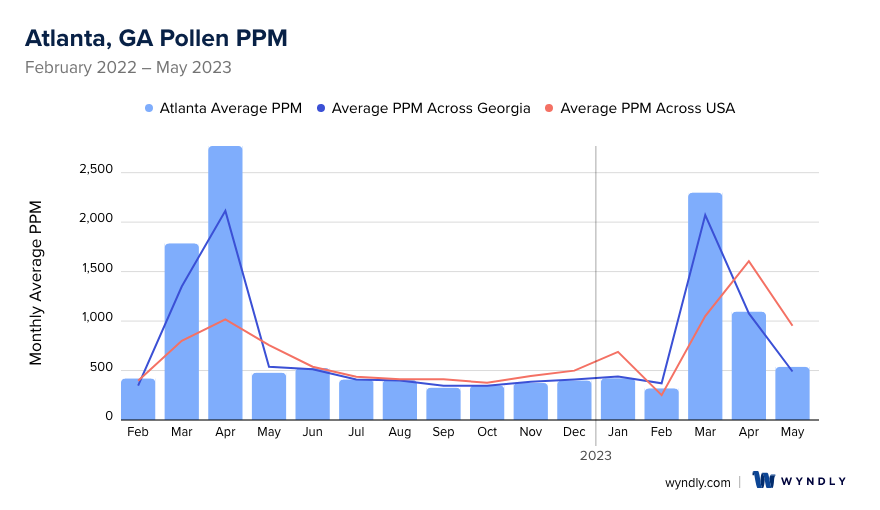
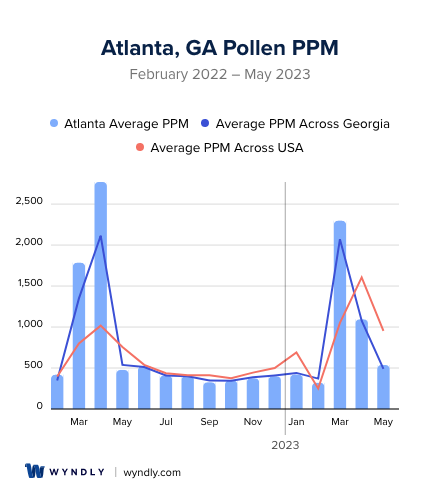
Atlanta, GA Pollen and Allergy Breakdown by Month
Grass
When is grass pollen highest in Atlanta, GA?
April has the highest grass pollen in Atlanta, GA with an average PPM of
When is grass pollen lowest in Atlanta, GA?
October has the lowest grass pollen in Atlanta, GA with an average PPM of
Tree
When is tree pollen highest in Atlanta, GA?
March has the highest tree pollen in Atlanta, GA with an average PPM of
When is tree pollen lowest in Atlanta, GA?
October has the lowest tree pollen in Atlanta, GA with an average PPM of
Weed
When is weed pollen highest in Atlanta, GA?
April has the highest weed pollen in Atlanta, GA with an average PPM of
When is weed pollen lowest in Atlanta, GA?
February has the lowest weed pollen in Atlanta, GA with an average PPM of
Atlanta, GA Pollen Monthly Breakdown by Pollen Type
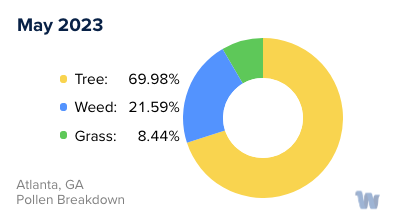
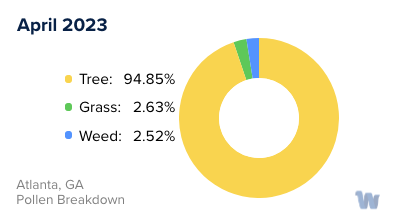
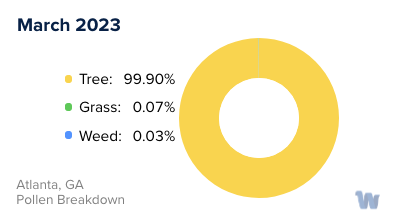
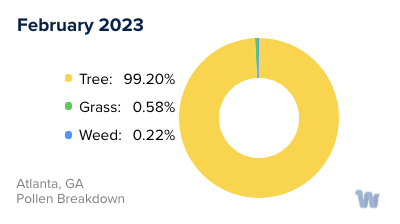
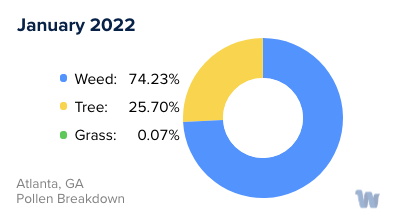
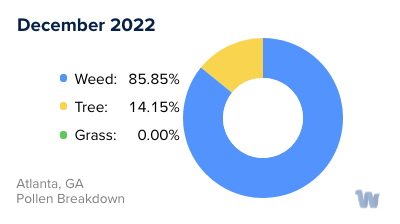
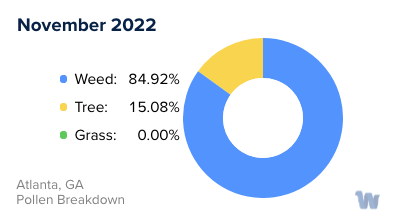
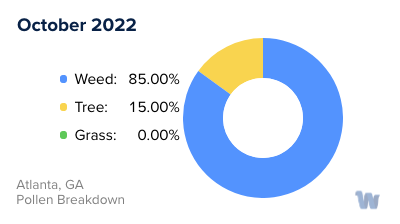
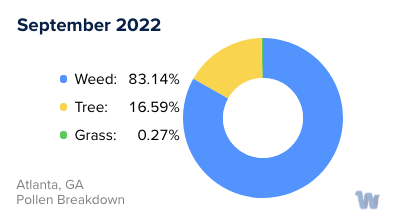
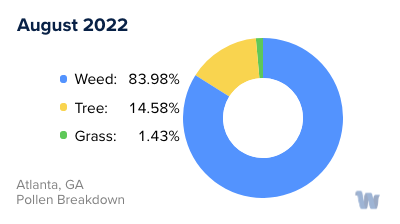
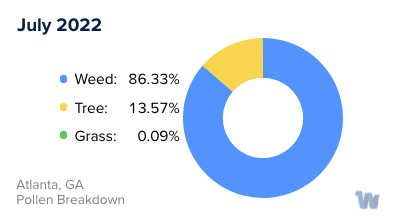
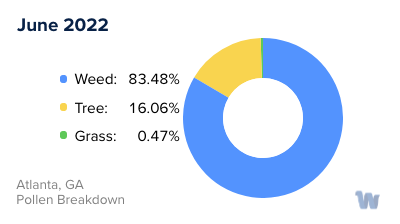
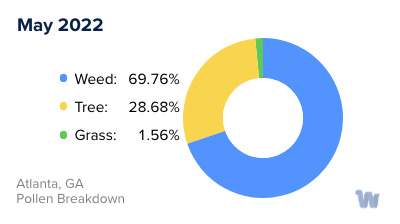
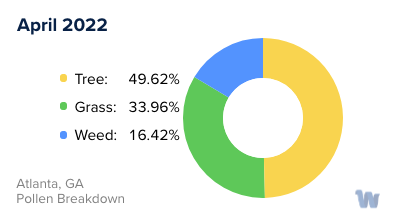
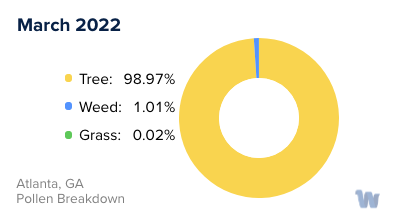
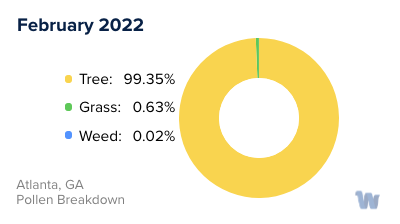
Pollen and Hay Fever in Atlanta, GA
In Atlanta, Georgia, the pleasant weather that typifies the spring and fall also creates a fertile environment for pollen allergens almost year-round. Pollen allergies, which are seasonal and not year-round, are primarily triggered by the pollen released by grasses, trees, and weeds.
The specific type of pollen causing allergic reactions can vary throughout the year. Tree pollen, for example, is the main allergen in the spring. As we transition into the summer months, grass pollen takes center stage. Finally, the fall season sees an uptick in pollen production from weeds. This cyclical nature of pollen allergens means that allergy sufferers can experience symptoms at almost any time of the year, particularly in the spring, summer, and fall seasons.
The allergy season in Georgia commences in the spring. However, owing to the region's mild winters, seasonal allergies can begin as early as January, leading to a longer allergy season compared to most other states. The highest pollen counts, and consequently the peak of seasonal allergies, typically occur in April, May, and September. It's during these months that those susceptible to pollen allergies may wish to limit their time outdoors or opt for evening activities when pollen counts are generally lower.
Winters in Georgia are characteristically mild, offering residents only a brief respite from seasonal allergies. A short break in December is all one can hope for before the pollen season recommences in January.
Some of the most common allergens in Georgia include ryegrass, Bermuda grass, oat grass, ragweed, pigweed, nettle, and tree pollens from species such as maple, alder, elm, juniper, and oak. Therefore, those living in Atlanta and the larger Georgia area should be aware of these common allergens and the associated peak seasons to better anticipate and manage their pollen allergies.

